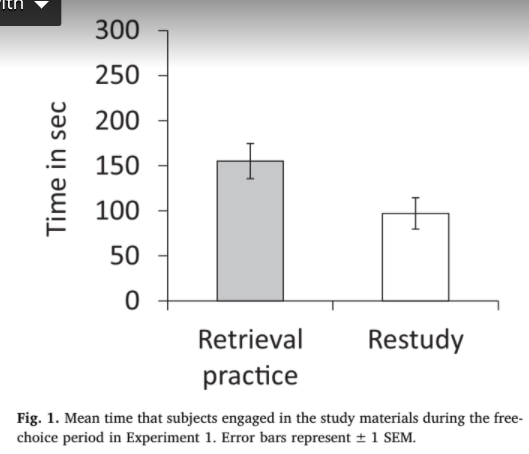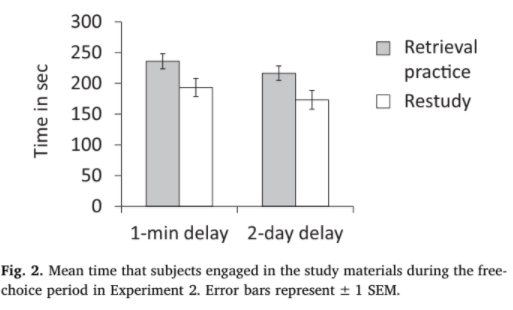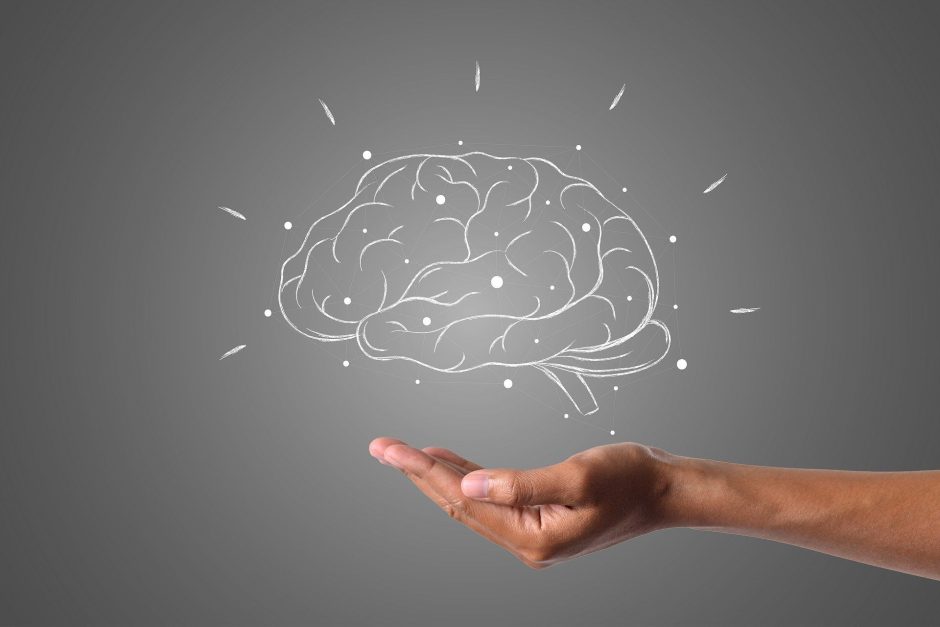Last week I stumbled upon the work of Prof Karl-Heinz Bäuml, Professor of Psychology at Regensburg University and wrote about how retrieval practice can “Revive forgotten memories.” From reading Bauml’s work, and that of Bernhard Pastötter, I have settled on the terms “backward” (enhancing memory for practiced material) and “forward” (benefiting subsequently encoded information) effects of testing.
Today, a second paper.
“Would you like to learn more? Retrieval practice plus feedback can increase motivation to keep on studying,” investigates how retrieval practice plus feedback can increase motivation to keep on studying – when given choices.
Like Bjork (2020), Rivers (2021), Finn (2020), Bäuml is also starting to question the impact of “further areas relevant to efficient learning,” like attention, metacognition and motivation. Pitching in that retrieval can reduce overconfidence and allow for more accurate metacognitive monitoring, thereby improving self-regulated learning, as he .
In this paper, Abel and Bäuml (2020) investigate intrinsic rather than extrinsic motivation, to keep on studying – even in the absence of extrinsic reasons to do so. Two reasons are put forward. The first “that experience of competence is fostered by optimal challenges that retrieval practice may provide.” That these “desirable difficulties” might increase individuals’ experience of competence and thus facilitate the development of intrinsic motivation. The second – to expect an “experience of competence” supported by positive feedback, “making one’s own progress transparent.” Furthermore, retrieval practice complemented with feedback may also help learners monitor their progress in learning when applied across several practice cycles. What I would refer to as successive relearning. In summary: retrieval practice combined with feedback might therefore enhance individuals’ motivation by facilitating their experience of competence in a learning task.
The clever design aspect of this study: Following the retrieval practice or restudy procedure, before completing a final test on the vocabularies, participants were left alone in the lab for a short period of time. They were “free to do what they wanted during this time interval, but, among others, had the option to learn more.” This free-choice period was the critical phase, where the researchers measured how much time participants chose to invest in further engagement in the study materials, even in the absence of external reasons to do so.
For reference, the participant “seemed genuinely surprised when they were debriefed about the free-choice period having still been part of the experiments.”
Results
Retrieval practice plus corrective feedback enhanced performance. As we would expect.
What we are more interested in, is how did participants spend their free time? In both a short (1 min) and long (2 day) delay between study, free-choice period and test.
| Experiment 1 | Experiment 2 |
 |  |
| Participants in the retrieval practice condition engaged with the study materials for a longer (155 seconds) compared to the restudy condition (96.97 second). d = 0.56. Participants who kept on engaging with the material for longer time intervals were more frequently from the retrieval-practice group. | The beneficial effect of retrieval practice on motivation can be maintained after longer delays, at least with two days between practice and test. |

Experiment 3 had the same design as Experiment 1 with participants tested in one of two practice conditions, engaging in either restudy or retrieval practice without corrective feedback. Retrieval practice without corrective feedback did not enhance performance from the first to the second retrieval-practice cycle and there was no difference between practice conditions.
The implication could be that retrieval practice does not contribute to the reported benefits for motivation OR it underlined the importance of feedback.
Moderators noted by Abel and Bäuml (2020) include variations in difficulty,
Conclusions
A rather smart procedure that managed to side step self-report measures of motivation, or confidence, or committment, for example. Abel and Bäuml (2020) showed increased intrinsic motivation associated with retrieval practice with feedback, an important factor for self-regulated learning.




Pingback: Getting it wrong helps to get it right – Edventures